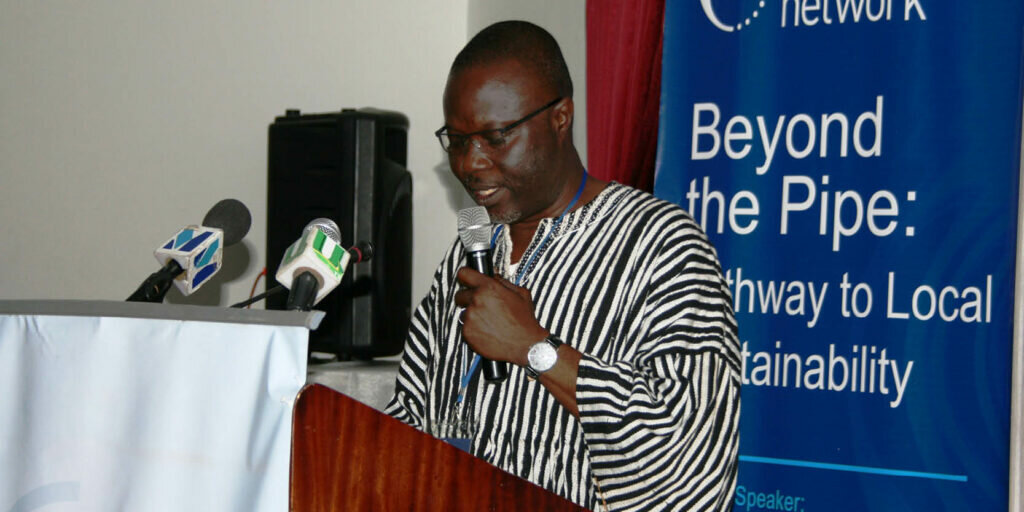It's not too late to make a Year End gift. Thank you. Donate Now!
Safe Water Network Ghana hosted its second annual ‘Beyond the Pipe’ forum (the sixth in a global series) on March 19th at the Holiday Inn at Airport City in Accra. Close to one hundred invited guests from the Ghana water sector attended the full-day event, which was sponsored by the Conrad N. Hilton Foundation.
Given the high failure rate of water systems, especially in rural, off-grid areas, Safe Water Network is developing the local capability to own and manage Safe Water Stations. Last year’s forum focused on the challenges to local sustainability, drawing upon our direct experience in Ghana, as well as our country-wide assessment of rural safe water approaches. At this year’s event, we presented new analyses and recommendations for expanding safe water access through public-private partnerships, financing, the use of appropriate technologies and the clustering of rural water systems overseen by a cluster manager.
 In his keynote address, Hon. Vincent Oppong Asamoah, Deputy Minister for Water Resources, Works and Housing, stressed the need for knowledge sharing and partnerships to advance the goal of uninterrupted and affordable water supply for all Ghanaians. “Certainly, there is value in a more coordinated effort at addressing sector challenges,” stated the Deputy Minister, “because no single institution or individual is equipped to solve this alone.”
In his keynote address, Hon. Vincent Oppong Asamoah, Deputy Minister for Water Resources, Works and Housing, stressed the need for knowledge sharing and partnerships to advance the goal of uninterrupted and affordable water supply for all Ghanaians. “Certainly, there is value in a more coordinated effort at addressing sector challenges,” stated the Deputy Minister, “because no single institution or individual is equipped to solve this alone.”
In the opening session on clustering water systems to improve sustainability, Mrs. Vida Duti, Country Director for IRC-Ghana, spoke on the difficulty of cost-effectively providing water to sparsely-populated rural areas. Innovative approaches like clustering are needed, she said, because the sector needs to move beyond good intentions: “We can’t just do the right things; we have to do the right things right.”
The next session, led by Mr. Emmanuel Nkrumah, Water and Sanitation Specialist for the World Bank, addressed the potential for public-private partnerships for community water supply. Such partnerships have worked in the water sector; but only in communities of 20,000 people or more. Panelists discussed the need to adapt the regulatory framework for similar approaches in smaller towns and rural communities.
In the financing session, Amanda Gimble, senior vice president of Strategic Initiatives at Safe Water Network, presented the results of financial analyses on water treatment systems and related businesses. The panel, chaired by Kwasi Osei of Prism Capital, discussed opportunities to leverage loans to more rapidly scale up successful approaches to water supply throughout the country.
“Water is a human right,” said Stanley Attafi of the Youth & Social Enterprise Fund during the session. “You can’t leave it 100% to the market, because people will be left out. But for sustainability, we need to recognize that it’s not just a social good. It’s also an economic good.”
Charles Nimako, head of Safe Water Network’s African initiatives, agreed with Attafi’s point. “Safe Water Stations must be cost-effective so that we can generate enough revenue to cover operating costs and on-going maintenance, while at the same time keeping the price affordable for all in need. We have demonstrated success at the local level, but there is much still to be done and Private Public Partnerships have great potential to leverage the strengths and interests of the key stakeholders to ensure that these systems are designed properly, operated correctly, and maintained so that affordable, safe water can flow for generations.”
Safe Water Network also presented early results from a new modular version of slow sand filtration technology, which the organization has deployed in three Volta Lake communities. While cautioning that slow sand filtration would not be appropriate for all communities, Benedict Kubabom, Director for Planning and Investment at the Community Water and Sanitation Agency, expressed interest in learning more about the approach as Safe Water Network continues to refine the technology. “If the modular version helps reduce costs, this will help us meet our objective to ensure affordable tariffs.”
Momentum to leverage the enthusiasm for creating an environment for Public Private Partnerships for rural community safe water provision resulted in a commitment to form several working groups. According to Safe Water Network’s Amanda Gimble, “We intend on creating a Financing working group and a X group. We’ve already had relevant Ghana ministries and executives from the private sector interested. The time has come to figure out how to create an environment in rural communities for PPPs to work.”
The Forum is part of an on-going Safe Water Network commitment to foster best practice across the water sector. In addition to the Forum’s lead sponsor, the Conrad N. Hilton Foundation, we would like to acknowledge and thank the other sponsors including Kosmos Energy, Newman’s Own Foundation, PepsiCo Foundation, and USAID.
Safe Water Network also hosts Forum’s in India, New York and Washington DC and conducts workshops, events and publishes a variety of reports based on our field work and third-party commissioned research. The formation of the Public Private Partnership working groups is an extension of our mission to create an environment for the public and private sectors to work together to overcome the obstacles to local sustainability.
Related links: